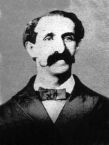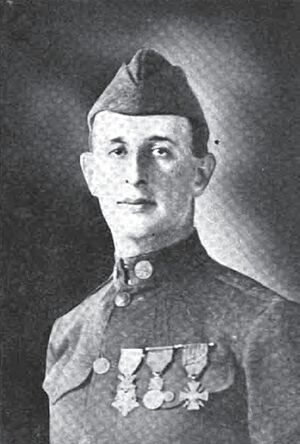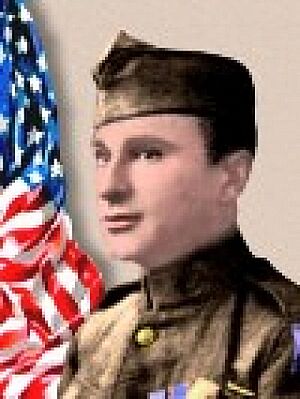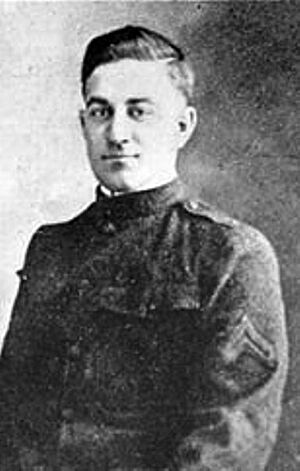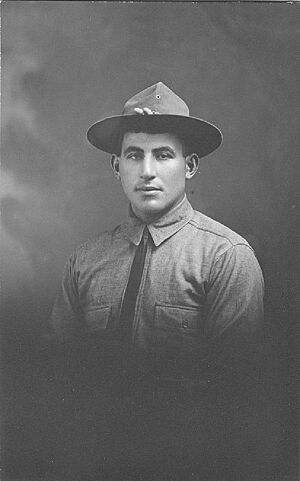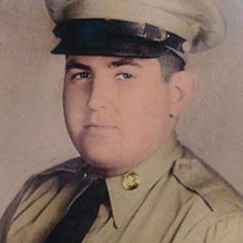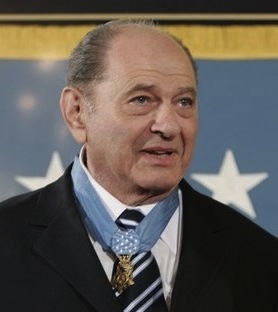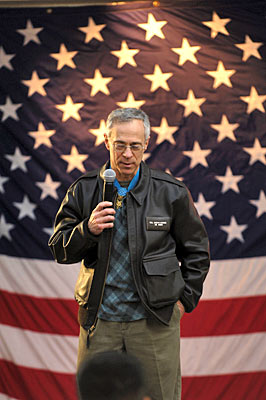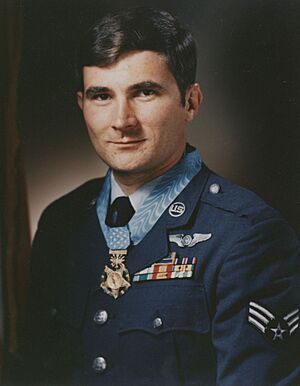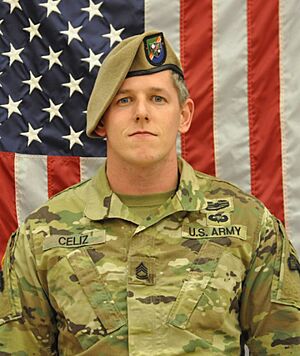List of Jewish Medal of Honor recipients facts for kids
The Medal of Honor is the highest award a member of the United States armed forces can receive. It was created during the American Civil War. To earn this medal, a person must show incredible bravery and risk their own life beyond what is expected, especially when fighting an enemy. The President of the United States personally gives this medal to those who earn it.
Since it began, over 3,400 people have received the Medal of Honor. At least 17 American Jews have earned this medal for their heroic actions, from the American Civil War all the way through the Vietnam War. The very first Jewish recipient was Benjamin B. Levy. He was a drummer boy, only seventeen years old, who picked up a rifle and saved his unit's flag during a battle in 1862. Another brave soldier, David Orbansky, also received it during the Civil War. Samuel Gross was the only Jewish American Marine to earn the medal for his actions in Fort Riviere, Haiti. During World War II, medic Benjamin L. Salomon bravely fought off 98 Japanese soldiers to protect wounded Americans. He received his medal in 2002, many years after he died in action. The last Jewish recipient was Tibor Rubin in 2005. He earned his medal for his actions in the Korean War in 1950, but it took 55 years for him to receive it.
Contents
About the Medal of Honor
The Medal of Honor is given for "amazing bravery and courage, risking one's life, far beyond the call of duty, in real combat against an armed enemy." This means recipients must show extraordinary heroism. Because of the extreme danger involved, the medal is often given after the person has died.
Before 1916, the rules for getting the Medal of Honor were not as strict. But in 1916, a special group was formed to make sure the medal was only given for the highest acts of bravery. Some awards given earlier were even taken back.
So far, at least 17 American Jews have received the Medal of Honor. Four of these were given after the person had died.
American Civil War Heroes
The American Civil War was a huge conflict in the United States. It was fought between the federal government and eleven states that wanted to leave the country and form their own government, called the Confederate States of America. The war began on April 12, 1861, soon after Abraham Lincoln became President of the United States. It ended four years later on April 9, 1865. More than 3 million people fought in this war, and over 10,000 battles took place.
Since the Medal of Honor was created during this war, 1,522 service members received it for their actions. At least four of these brave individuals were Jewish.
- Note: The descriptions below are taken from the official Medal of Honor citations.
| Image | Name | Service | Rank | Place of action | Date of action | Notes | References |
|---|---|---|---|---|---|---|---|
|
|
Abraham Cohn | Army | Sergeant Major | Battle of the Wilderness and Battle of the Crater, Virginia | May 6, 1864 and Jul 30, 1864 | "During Battle of the Wilderness rallied and formed, under heavy fire, disorganized and fleeing troops of different regiments. At Petersburg, Va., ... bravely and coolly carried orders to the advanced line under severe fire." | |
|
|
Leopold Karpeles | Army | Sergeant | Battle of the Wilderness, Virginia | May 6, 1864 | "While color bearer, rallied the retreating troops and induced them to check the enemy's advance" | |
| Benjamin Levy | Army | Private | Battle of Glendale, Virginia | Jun 30, 1862 | A drummer boy who took a sick comrade's gun and joined the fight. When the flag bearers were shot down, he carried the colors and saved them from being captured. | ||
|
|
David Orbansky | Army | Private | Shiloh, Tennessee, Vicksburg, Mississippi | 1862 and 1863 | "Gallantry in actions" |
Indian Wars Heroes
The Indian Wars were a series of conflicts in the United States between the government and Native American people. These wars happened from the 1600s to the early 1900s. They often led to Native American lands being taken over, or to Native Americans being forced to move to Indian reservations.
During these wars, 426 people received the Medal of Honor. One American Jew, Simon Suhler, earned the medal during this time. He enlisted in the army using the name Charles Gardner.
- Note: The description below is taken from the official Medal of Honor citation.
| Image | Name | Service | Rank | Place of action | Date of action | Notes | References |
|---|---|---|---|---|---|---|---|
|
|
Simon Suhler | Army | Private | Arizona | Aug 1868 – Oct 1868 | Enlisted under the name Charles Gardner; "Bravery in scouts and actions against Indians" |
Haiti Conflict Hero
In 1915, Haiti faced a lot of political unrest and violence. This made it dangerous for American citizens and businesses there. After a revolt killed the dictator General Vilbrun Guillaume Sam, President Woodrow Wilson sent the United States Marines to bring back order and protect Americans. The Marines fought against rebel groups called Cacos. In a fierce battle at Fort Riviere, Haiti, the Cacos were defeated in hand-to-hand combat. Six Marines received the Medal of Honor for their bravery in this battle. This included Dan Daly, Smedley Butler, and the only Jewish Marine to ever receive the medal, Samuel Marguiles, who was known as Samuel Gross.
- Note: The description below is taken from the official Medal of Honor citation.
| Image | Name | Service | Rank | Place of action | Date of action | Notes | References |
|---|---|---|---|---|---|---|---|
|
|
Samuel Gross | Marine Corps | Private | Fort Riviere, Haiti | Nov 17, 1915 | Also known as Samuel Marguiles; "was the second man to pass through the breach [in the fort's walls] in the face of constant fire from the Cacos and, thereafter, for a 10-minute period, engaged the enemy in desperate hand-to-hand combat". |
World War I Heroes
When World War I started, the United States first tried to stay out of the fighting. However, in 1915, a German submarine sank the British ship Lusitania, killing 128 Americans. This made President Woodrow Wilson demand an end to attacks on passenger ships. Germany agreed for a while, but then started unrestricted submarine warfare again in 1917. Three years after the war began, the United States joined the fight. By the end of the war, over 4.7 million American soldiers, sailors, and Marines had served.
More than 250,000 Jewish Americans served in the armed forces during World War I. Over 3,000 of them died, and another 12,000 were wounded.
One hundred twenty-four people received the Medal of Honor for their actions in this war. Four of them were Jewish. One of these, William Sawelson, received it after he was killed. He died trying to help another injured soldier while under heavy machine gun fire.
This color means the Medal of Honor was given after the person died.
- Note: The descriptions below are taken from the official Medal of Honor citations.
| Image | Name | Service | Rank | Place of action | Date of action | Notes | References |
|---|---|---|---|---|---|---|---|
| Sydney G. Gumpertz | Army | First Sergeant | Bois-de-Forges, France | Sep 29, 1918 | "Gumpertz left the platoon of which he was in command and started with 2 other soldiers through a heavy barrage toward the machinegun nest. His 2 companions soon became casualties from bursting shells, but 1st Sgt. Gumpertz continued on alone in the face of direct fire from the machinegun, jumped into the nest and silenced the gun, capturing 9 of the crew." | ||
| Benjamin Kaufman | Army | First Sergeant | Forest of Argonne, France | Oct 4, 1918 | "He took out a patrol for the purpose of attacking an enemy machinegun which had checked the advance of his company. Before reaching the gun he became separated from his patrol and a machinegun bullet shattered his right arm. Without hesitation he advanced on the gun alone, throwing grenades with his left hand and charging with an empty pistol, taking one prisoner and scattering the crew, bringing the gun and prisoner back to the first-aid station." | ||
| William Sawelson* | Army | Sergeant | Grand-Pre, France | Oct 26, 1918 | "Hearing a wounded man in a shell hole some distance away calling for water, Sgt. Sawelson, upon his own initiative, left shelter and crawled through heavy machinegun fire to where the man lay, giving him what water he had in his canteen. He then went back to his own shell hole, obtained more water, and was returning to the wounded man when he was killed by a machinegun bullet." | ||
| William Shemin | Army | Sergeant | Vesle River, France | Aug 9, 1918 | "Sergeant Shemin distinguished himself by acts of gallantry and intrepidity above and beyond the call of duty while serving as a Rifleman with G Company, 2d Battalion, 47th Infantry Regiment, 4th Division, American Expedition Forces, in connection with combat operations against an armed enemy on the Vesle River, near Bazoches, France from August 7 to August 9, 1918. Sergeant Shemin left cover and crossed open space, repeatedly exposing himself to heavy machine-gun and rifle fire, to rescue the wounded. After Officers and Senior Noncommissioned Officers had become casualties, Sergeant Shemin took command of the platoon and displayed great initiative under fire until wounded on August 9. Sergeant Shemin's extraordinary heroism and selflessness, above and beyond the call of duty, are in keeping with the highest traditions of the military service and reflect great credit upon himself, his unit, and the United States Army." |
World War II Heroes
During World War II, 16.1 million American service members served. More than 650,000 of these were Jewish American men and women. Over 50,000 American Jews received medals during the war, including five Medals of Honor.
Three Jewish Americans received the Medal of Honor after they died: Isadore S. Jachman, Ben L. Salomon, and Raymond Zussman. Jachman and Salomon were both killed while trying to help other fallen soldiers. Zussman earned his medal for risking his life on September 12, 1944, but he died less than a month later before he could receive it.
This color means the Medal of Honor was given after the person died.
- Note: The descriptions below are taken from the official Medal of Honor citations.
| Image | Name | Service | Rank | Place of action | Date of action | Notes | References |
|---|---|---|---|---|---|---|---|
|
|
Isadore S. Jachman* | Army | Staff Sergeant | Flamierge, Belgium | Jan 4, 1945 | "[L]eft his place of cover and with total disregard for his own safety dashed across open ground through a hail of fire and seizing a bazooka from a fallen comrade advanced on the tanks, which concentrated their fire on him. Firing the weapon alone, he damaged one and forced both to retire." | |
|
|
Ben L. Salomon* | Army | Captain | Battle of Saipan, Mariana Islands | Jul 7, 1944 | Held off advancing Japanese soldiers to protect the wounded he was treating. | |
|
|
Raymond Zussman* | Army | Second Lieutenant | Noroy-le-Bourg, France | Sep 12, 1944 | "[R]econnoitered alone on foot far in advance of his remaining tank and the infantry ... Fully exposed to fire from enemy positions only 50 yards distant, he stood by his tank directing its fire ... Again he walked before his tank, leading it against an enemy-held group of houses, machinegun and small arms fire kicking up dust at his feet. ... Going on alone, he disappeared around a street corner. The fire of his carbine could be heard and in a few minutes he reappeared driving 30 prisoners before him." |
Korean War Heroes
After Korea was divided into two countries, North and South, tensions grew. North Korea was supported by countries like Russia and China, while democratic South Korea was supported by the United Nations and the United States. In 1950, the United States became involved. Over the next three years, more than 1.5 million U.S. service members served in Korea. During the war, 133 Medals of Honor were given.
On July 23, 1950, Tibor Rubin was a rifleman in Korea. His unit had to retreat, and he was ordered to stay behind to keep the road open. For 24 hours, he single-handedly fought off many North Korean troops, causing heavy losses and helping capture many prisoners. A few months later, Chinese forces attacked his unit at night. Rubin bravely manned a machine gun, allowing his unit to retreat safely. He caused many casualties to the attacking forces. During this battle, he was badly wounded and captured by Chinese forces. Even though the Chinese offered to release him early and send him back to his home country of Hungary, he refused. He stayed a prisoner and often risked his life by sneaking out at night to find food and medicine for other wounded prisoners.
In 1993, the United States Army looked into whether there had been unfair treatment in giving out medals. They found that Tibor Rubin, a Jewish American and Holocaust survivor, had been unfairly overlooked for the Medal of Honor because of his religion. In 2005, 55 years later, President George W. Bush finally presented the Medal of Honor to Rubin in a ceremony at the White House.
| Image | Name | Service | Rank | Place of action | Date of action | Notes | References |
|---|---|---|---|---|---|---|---|
| Leonard M. Kravitz* | Army | Private First Class | Yangpyong, South Korea | Mar 6, 1951 | "On March 6 and 7, 1951, Kravitz' unit's positions at Yangpyong were overrun by the enemy. Kravitz voluntarily manned a machine-gun position, forcing the enemy to direct its efforts against him and helping his comrades to retreat at the cost of his own life." | ||
| Tibor Rubin | Army | Corporal | Republic of Korea | Jul 23, 1950 – Apr 20, 1953 | During a 24-hour battle, he slowed down an attack by Chinese troops. This allowed other soldiers to successfully retreat. Even though he was badly wounded and captured, he chose to stay in the Chinese prison. While there, he risked his own safety by sneaking out at night to find food for other soldiers and give medical care to the sick and wounded prisoners. |
Vietnam War Heroes
The Vietnam War was a conflict between the Communist-supported Democratic Republic of Vietnam and the United States-supported Republic of Vietnam. It began in 1959 and ended on April 30, 1975.
During the Vietnam War, 246 Medals of Honor were given. 154 of these were given after the person had died. Two American Jews received the Medal: Jack H. Jacobs from the Army and John Levitow from the Air Force.
| Image | Name | Service | Rank | Place of action | Date of action | Notes | References |
|---|---|---|---|---|---|---|---|
| Jack H. Jacobs | Army | First Lieutenant | Kien Phong Province, Republic of Vietnam | Mar 9, 1968 | Although seriously wounded and bleeding heavily, he took command and ordered a retreat. He then repeatedly went back through heavy fire to rescue other wounded, including his company commander, and treated their injuries. Three times, he fought off enemy squads who were also looking for wounded American soldiers in the same area, killing three and wounding several others. | ||
| John Levitow | Air Force | Airman First Class | Long Binh Army post, Republic of Vietnam | Feb 24, 1969 | Although severely wounded himself from a mortar round, he moved another wounded crew member to safety. He then used his own body to cover and move a smoking flare from inside the aircraft. He threw it from the back of the plane just as it separated and caught fire in the air, clearing the aircraft. |
Operation Freedom's Sentinel Hero
Operation Freedom's Sentinel (OFS) was the name the U.S. government used for its mission in Afghanistan. It followed Operation Enduring Freedom and was part of the larger Global War on Terrorism. OFS began on January 1, 2015, and involved fighting terrorism and working with allies.
| Image | Name | Service | Rank | Place of action | Date of action | Notes | References |
|---|---|---|---|---|---|---|---|
| Christopher Andrew Celiz* | Army | Sergeant First Class | Paktia Province, Afghanistan | Jul 12, 2018 | Celiz placed himself directly between the helicopter cockpit and the enemy, making sure the aircraft could leave safely. As the helicopter lifted off, Celiz was hit by enemy fire. Even though he was injured, he understood the danger to the aircraft. Celiz signaled to the pilots to leave instead of waiting for him. His selfless actions saved the life of the evacuated soldier and likely prevented more casualties among his team and the aircrew. Celiz died because of his actions. |
See also
- List of Jewish Americans in the military
- Jewish American military history
 | William L. Dawson |
 | W. E. B. Du Bois |
 | Harry Belafonte |


